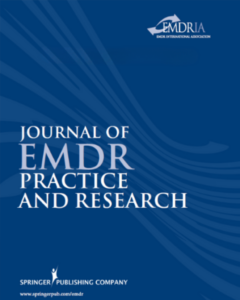Comparison of eye movement desensitization and reprocessing (EMDR) and duloxetine treatment outcomes in women patients with somatic symptom disorder (Sleep and Hypnosis)
The paper explored the efficiency of the eye movement desensitization and reprocessing (EMDR) therapy in somatic symptom disorder (SSD).
Read MoreEye movement desensitization and reprocessing vs. treatment-as-usual for non-specific chronic back pain patients with psychological trauma: A randomized controlled pilot study (Frontiers in Psychiatry)
Preliminary evidence that pain-focused EMDR could help non-specific chronic back pain patients with previous psychological trauma.
Read MoreEfectos Neuropsicológicos y Fisiológicos de la Terapia EMDR en una Mujer con Trastorno por Estrés Postraumático: Un Caso de Estudio (Journal of EMDR Practice and Research)
Este artículo presenta una revisión completa de literatura acerca del impacto neurocognitivo del trastorno por estrés postraumático (TEPT) e…
Read MoreSkuteczność terapii EMDR w zmniejszaniu dystresu psychicznego u osób, które przeżyły katastrofy naturalne – przegląd (Journal of EMDR Practice and Research)
Katastrofy naturalne mają wpływ na całe społeczności ludzkie, zarówno w wymiarze indywidualnym, jak i ekonomicznym czy społecznym. Chociaż…
Read MoreThe Perceived Effects of Standard and Addiction-Specific EMDR Therapy Protocols (Journal of EMDR Practice and Research)
Existing literature on co-occurring posttraumatic stress disorder (PTSD) and addictive disorders suggests improved outcomes when both diagnoses are treated concurrently.
Read MoreEMDR to Treat Children and Adolescents: Clinicians’ Experiences Using the EMDR Journey Game (Journal of EMDR Practice and Research)
Childhood trauma is a pervasive social issue with profound consequences. EMDR therapy is an effective treatment for children.
Read MoreEMDR in the Treatment of Panic Disorder With Agoraphobia: A Case Description (Journal of EMDR Practice and Research)
Resolution of traumatic childhood memories through EMDR can make significant difference to symptoms of panic disorder with agoraphobia.
Read MoreA Model of Clinical Intervention in the Maternity Ward: The Breastfeeding and Bonding EMDR Protocol (Journal of EMDR Practice and Research)
This article suggests an intervention for breastfeeding difficulties to avoid perinatal crisis: the Breastfeeding and Bonding EMDR Protocol.
Read MoreThérapie de groupe EMDR pour des femmes agressées sexuellement au Congo (Journal of EMDR Practice and Research)
Chaque année, des milliers de femmes sont victimes d’agressions sexuelles en République démocratique du Congo. En 2008, l’auteur a été invité…
Read MoreQuand suspecter et comment diagnostiquer le trouble dissociatif de l’identité (Journal of EMDR Practice and Research)
Un trouble dissociatif de l’identité (TDI) jusque-là non diagnostiqué peut exister chez des individus qui sont évalués en vue de l’EMDR…
Read MoreDegrading traumatic memories with eye movements: A pilot functional MRI study in PTSD (European Journal of Psychotraumatology)
Script driven imagery before & after recall of traumatic memories is feasible to investigate working mechanisms with eye movements in PTSD.
Read MoreEffect of Ocular Movements during Eye Movement Desensitization and Reprocessing (EMDR) Therapy: A Near-Infrared Spectroscopy Study (PLoS ONE)
The aim of this study is to investigate the effects of ocular movements of EMDR on the hemodynamics of the prefrontal cortex (PFC).
Read More


